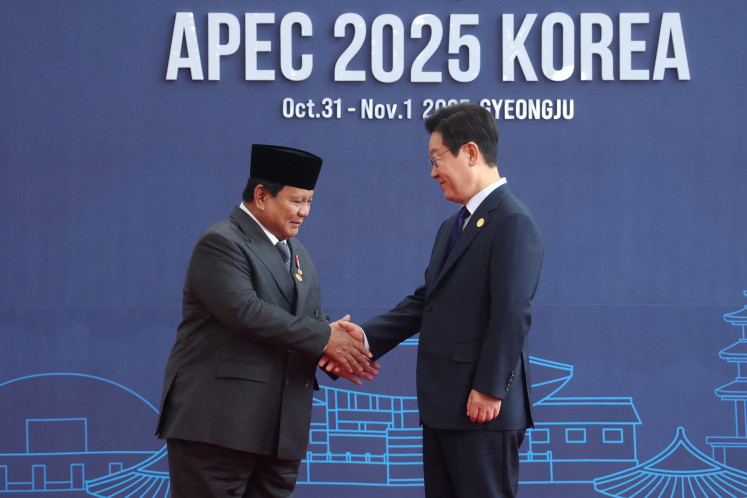Popular Reads
Top Results
Can't find what you're looking for?
View all search resultsPopular Reads
Top Results
Can't find what you're looking for?
View all search resultsEast Java villagers rise from past stigma
For 54-year-old Sugito, owning a plot of land with a yard and a field in his village was previously just a dream
Change text size
Gift Premium Articles
to Anyone
For 54-year-old Sugito, owning a plot of land with a yard and a field in his village was previously just a dream.
When he first followed his father and moved from Bakung to Banyu Urip hamlet in Ngadipuro village, in the East Java town of Blitar back in 1965, Sugito could only find work as a kapok picker in privately managed plantations owned by the Blitar regency administration.
At that time, around 70 percent of Banyu Urip residents, including Sugito's parents, lived under the shadow of the political stigma enforced by Soeharto's New Order regime -- the residents were labeled as members or allies of the outlawed Indonesian Communist Party (PKI).
This stigma made Sugito and most members of the Banyu Urip community afraid to put a foot wrong: They lived in despair for many years, lacked self-confidence and were afraid of newcomers.
Their education and economic levels were left far behind those of other communities in the regency, as could be seen from the small number of children who passed elementary school and the number of illiterate people in the community.
Now, however, the lives of the people living in Banyu Urip village have changed considerably.
Sugito said the change started when an anthropology graduate from Yogyakarta's Gadjah Mada University, Cecilia Yulianti Hendayani, came to the village with three of her colleagues from the Bishopric Youth Commission in Surabaya at the end of 1996.
Cecilia, or Yanti as she is known, has slowly succeeded in changing the attitudes of villagers oppressed by previous government's political stigma and encouraging them to be brave and more open.
Through her work, Yanti has bridged the cultural and religious complexities of the village community. She introduced the idea of ethnic, racial and religious pluralism to Banyu Urip villagers, in particular to young children who attend the village's inter-faith kindergarten, Griyo Pitoyo.
Her work even won her a 2008 Maarif Award, which acknowledges the efforts of those involved in community and social work.
The inter-faith kindergarten's religious and cultural studies became an entry point for Yanti to empower members of the community.
She said it all began when she undertook field studies in the village during her 1996 visit.
"I had to stay and mix together with the people in this village. I saw that there was something that wasn't quite right in their lives.
"They looked as though they didn't have any spirit for life ... they were always fearful," Yanti told The Jakarta Post at her home in Blitar.
In the beginning, Yanti sought to dig up information about what occurred in the village's past. She initially did this by going from door-to-door, but this method proved to be ineffective.
Yanti then began to interact directly with community members who gathered at the belik (a communal pool near a water source) in the afternoons. Once the villagers got used to Yanti, they found the courage to talk to her.
From then on, little-by-little, Yanti started to discover what was really troubling the people in the village.
She discovered that the community had many needs and wishes but the stigma they had been labeled with kept them from openly expressing their feelings.
"When people met face-to-face, there was no one courageous enough to stare back. They all just bowed and shook their heads, then went away. My heart felt as though it had been sliced. Why was there a community like this in Java?" said Yanti of her initial encounters with the Banyu Urip villagers.
She discovered that most of the villagers had been marked as people who had been involved with the PKI organization: Most of them were "fugitives" from other villages in Blitar regency.
Banyu Urip is located on top of a hill, 32 kilometers south of Blitar. The village is only accessible by a rocky road that passes through a thick teak forest, making it virtually isolated from other villages -- hence the stigma prevailed and the community became somewhat "forgotten" by outsiders.
When Yanti first visited the village, there was neither electricity nor piped water supplied by the government.
Yanti first invited the teenagers in the village to gather and join in group activities, in which they were taught the values of tolerance and mutual appreciation.
She then invited parents to gather, and encouraged them to speak out. Graduates from Surabaya's 17th August University School of Commerce and Administration helped develop small discussion groups.
"There were various topics open for discussion. But it started simply. The most important thing was that the villagers were courageous enough to speak out and express their opinions, especially if they didn't agree on something," Yanti said.
She also invited young children to form a playgroup. The members included children from different religious and cultural backgrounds who were taught to interact and develop tolerance and appreciation for others, regardless of their religious backgrounds and cultural differences.
The playgroup then became a model for teenagers and adults.
Through the playgroup, and from learning religious tolerance, the lives of the people in Banyu Urip have improved and their dignity is slowly being restored.










